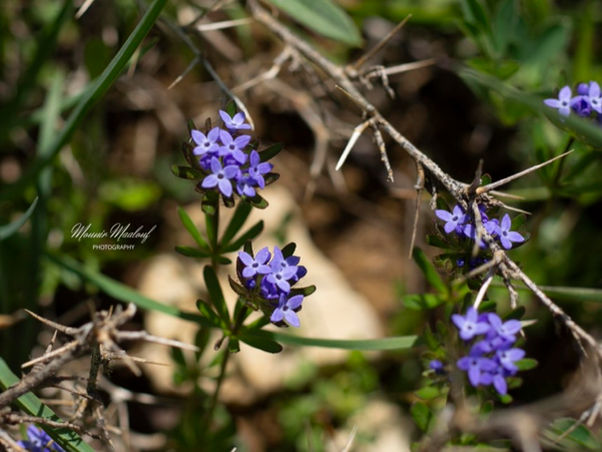Family |
Rubiaceae
Asperula arvensis
L.
Asperula arvensis L.
(Nouvelle Flore du Liban et de la Syrie, vol. 3, Pl. CLII nº 3; 1983)
Life-form & habit: Erect, branched annual herb, 15–40 cm tall.
Leaves: Inferior leaves obovate, in whorls of 4; upper leaves in whorls of 6–8, linear, obtuse.
Inflorescence & flowers: Terminal, fascicled-capitulate clusters. Involucral bracts unequal, long-ciliate and silky, sometimes exceeding the flowers. Corolla blue, with a funnel-shaped tube barely longer than the limb. Limb with 4 somewhat hooded, blunt lobes.
Fruit: Large, subglobose, granular mericarps.
Phenology: Flowers from March to April.
Habitat & elevation: Cultivated fields, pastures, and fallow land.
Lebanese distribution: Ct. Saïda, Beirut, Tripoli, Mitein; Mi. Chemlan, Bhamdoun, East of Douma, Douma, Broummana, Jabal Terbol, Harissa, Jamhour; Mm. ‘Ain Deheb, Ehden Forest, Dahr-el-Baïdar, Barouk–Maasser; Met. Beqa‘a, Rayak; Ve. Aïnata; Sud. Marjayyoun; Hem. below Rachaya, Hermon.
Native range: Albania, Algeria, Baleares, Bulgaria, Corse, Cyprus, East Aegean Is., France, Germany, Greece, Hungary, Iran, Iraq, Italy, Kirgizstan, Kriti, Krym, Lebanon-Syria, Libya, Morocco, North Caucasus, NW. Balkan Pen., Palestine, Portugal, Romania, Sardegna, Sicilia, South European Russia, Spain, Switzerland, Transcaucasus, Tunisia, Turkmenistan, Türkey, Türkey-in-Europe, Ukraine. (KEW)
Introduced into: Czechia-Slovakia, Denmark, Great Britain, Ireland, Maryland, New York, Northwest European Russia, Norway, Sweden. (KEW)


